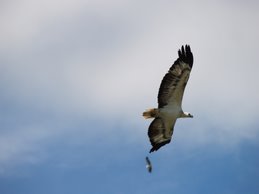Missing link found? Scientists unveil fossil of 47 million-year-old primate, Darwinius masillae
 The 47 million year old fossilized remains of a primate is seen at the American Museum of Natural History in New York.
The 47 million year old fossilized remains of a primate is seen at the American Museum of Natural History in New York.Feast your eyes on what a group of scientists call the Holy Grail of human evolution.
A team of researchers unveiled an almost perfectly intact fossil of a 47 million-year-old primate they say represents the long-sought missing link between humans and apes.
Officially known as Darwinius masillae, the fossil of the lemur-like creature dubbed Ida shows it had opposable thumbs like humans and fingernails instead of claws.
Scientists say the cat-sized animal's hind legs offer evidence of evolutionary changes that led to primates standing upright - a breakthrough that could finally confirm Charles Darwin's theory of evolution.
"This specimen is like finding the Lost Ark for archeologists," lead scientist Jorn Hurum said at a ceremony at the American Museum of Natural History.
"It is the scientific equivalent of the Holy Grail. This fossil will probably be the one that will be pictured in all textbooks for the next 100 years."
A team of amateur fossil hunters discovered the near-perfect remains inside a mile-wide crater outside of Frankfurt in 1983.
Experts believe the pit was a volcanic caldera where scores of animals from the Eocene epoch were killed and their remains were kept remarkably well-preserved.
Though the pit has been a bountiful source of other fossils, the inexperienced archeologists didn't realize the value of their find.
Years later, the University of Oslo bought the 95%-intact fossil, and Hurum studied it in secret for two years.
His colleague, Jens Franzen, hailed the discovery as "the eighth wonder of the world."
"We're not dealing with our grand, grand, grandmother, but perhaps with our grand, grand, grand aunt," Franzen said.
The unveiling of the fossil came as part of a carefully-orchestrated publicity campaign unusual for scientific discoveries.
A History Channel film on the discovery will air next week.
A book release and a slew of other documentaries will follow.


No comments:
Post a Comment